May 17, 2025 | 03:41 GMT +7
May 17, 2025 | 03:41 GMT +7
Hotline: 0913.378.918
May 17, 2025 | 03:41 GMT +7
Hotline: 0913.378.918
Mr. Do Duc Duy, the Minister of Agriculture and Environment, presided over a preliminary conference on April 9 to evaluate the project's one-year implementation, which is titled "Sustainable development of one million hectares of high-quality, low-emission rice cultivation associated with green growth in the Mekong Delta by 2030" (also referred to as the One million hectares of high-quality rice project).
Additionally, Representatives of Provincial People's Committees, Departments of Agriculture and Rural Development from 12 provinces and cities in the Mekong Delta, Permanent Deputy Governor of the State Bank of Vietnam Dao Minh Tu, and leaders of affiliated units, including Deputy Minister Tran Thanh Nam, attended the event. International organizations, community associations, enterprises, and cooperatives also participated in the conference.
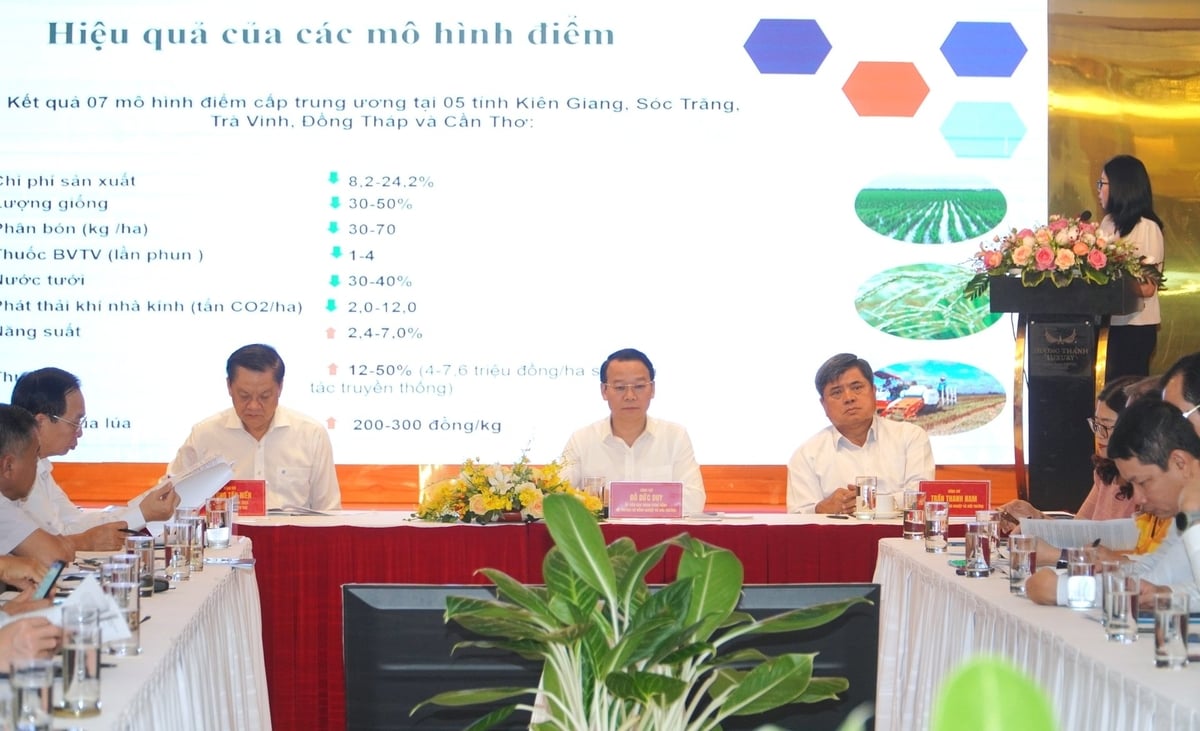
Minister of Agriculture and Environment Do Duc Duy chaired the conference to review one year of implementing the One million hectares of high-quality rice project in Can Tho City. Photo: Kim Anh.
The project is a proactive measure that is consistent with the sustainable agricultural development strategy, as Minister Do Duc Duy underscored in his reflection on its one-year implementation. He observed that "acting earlier will enable us to capture the green consumption trend more quickly." In the absence of timely preparation, Vietnamese enterprises, particularly rice exporters, are at risk of being excluded from international markets.
According to the minister, the global market may soon prevent the importation of substandard rice that emits high levels of emissions. When that time arrives, only green rice products that are grown using low-emission practices will be accepted into these demanding markets.
This trend has already been observed in other sectors, including timber and fisheries. Seafood exports were once prosperous; however, they are currently confronted with increasingly stringent regulations regarding antibiotic use, residue management, and traceability. Similarly, Vietnam's wood industry, which previously had easy export access, now necessitates FSC certification to comply with international sustainability standards.
As a strategic export commodity, rice will inevitably adhere to this trend. Acquiring the "low-emission rice" label will soon be a requirement for entry into numerous critical markets.
The project has achieved promising results thus far, which have verified its feasibility, effectiveness, and solid strategic direction. It has significantly changed the way of thinking and increased awareness among the political system, the business community, and the general public regarding sustainable development in Vietnam's rice sector.
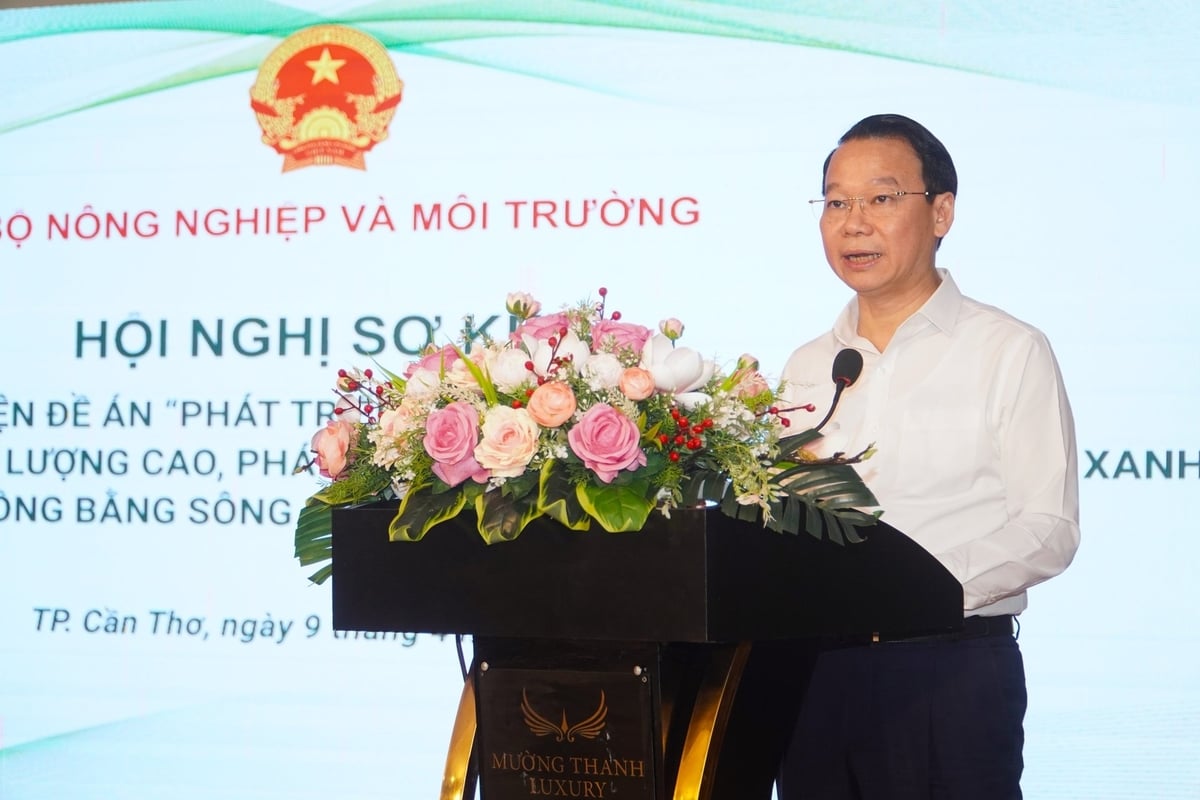
Minister Do Duc Duy said that participating in the One million hectares of high-quality rice project is not only a necessary preparation, but also an opportunity for businesses to maintain and expand their markets. Photo: Kim Anh.
The project has grown from seven pilot models that were initially implemented by the central government in five provinces to 101 models that span over 4,500 hectares.
Progressively, farmers have implemented advanced production techniques, including alternate wet-and-drying (AWD), "three reductions, three gains," "one must, five reductions," and more precise fertilizer application. These practices also prioritize the reduction of greenhouse gas emissions, which serves as a solid foundation for the development, standardization, and expansion of sustainable rice production in the Mekong Delta.
In addition, the project has established the foundation for the development of sustainable rice value chains. Seed provision, input supply, and output purchase are among the numerous significant enterprises that have integrated into the high-quality rice ecosystem, providing assistance to producers.
Furthermore, the Vietnam Food Association is collaborating with international partners and businesses to create point-of-sale materials that will push for Vietnamese green, low-emission rice in global markets.
Despite the fact that the One Million Hectares of Rice Project has yielded some positive results, it continues to experience numerous challenges and deficiencies in its practical implementation.
Notably, the objectives of the project are still not entirely obvious to certain localities. Some provinces are prioritizing infrastructure development. Though the goal is valid, it must be performed concurrently with the project's execution. Minister Do Duc Duy clarified that certain phases can be implemented promptly by capitalizing on prior infrastructure investments.
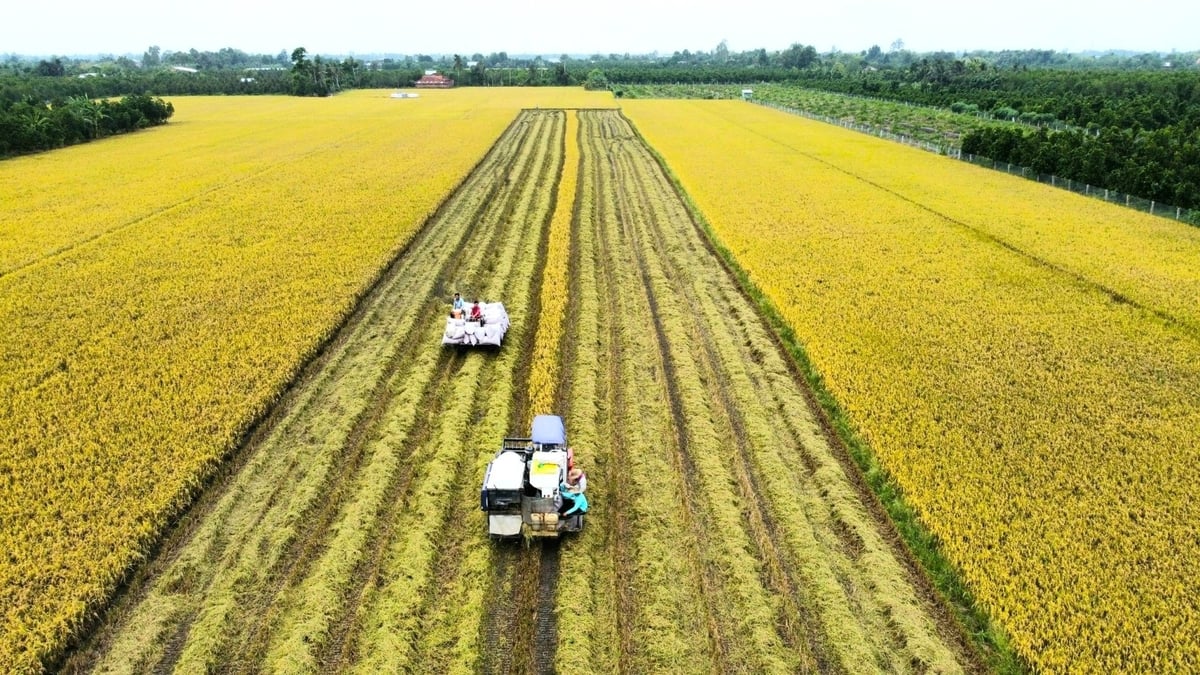
It is expected that by 2025, the area applying emission reduction farming processes will reach nearly 313,000 hectares. Photo: Kim Anh.
In contrast, certain localities are overly focused on carbon credit trading, despite the fact that the project's primary objective is to shift agricultural production toward sustainability by enhancing product quality and added value, reducing costs, and increasing farmers' incomes. Therefore, cultivation practices, logistics systems investment, and deep processing have not yet been adequately addressed.
Further, the project's overall progress has not been matched by the development of irrigation infrastructure for water management and field operation, despite the fact that this infrastructure is a prerequisite for the application of advanced cultivation techniques.
Proactive adoption of new production methods by farmers, cooperatives, and enterprises has been lacking in certain regions. Particularly in terms of initial investment expenses, there is a constant preference to depend significantly on state assistance.
In addition, the scale of implementation is modest, and rice straw management is presently restricted to pilot models in order to reduce emissions.
The current deficiencies and obstacles are transforming into impediments that must be promptly identified and resolved to guarantee the project's more efficient execution in the time ahead.
As a result, Minister Do Duc Duy urged the localities in the Mekong Delta region to promptly approve their respective projects or implementation plans. Concurrently, he encouraged them to establish support policies that were tailored to the unique conditions of their respective regions and within their jurisdiction.
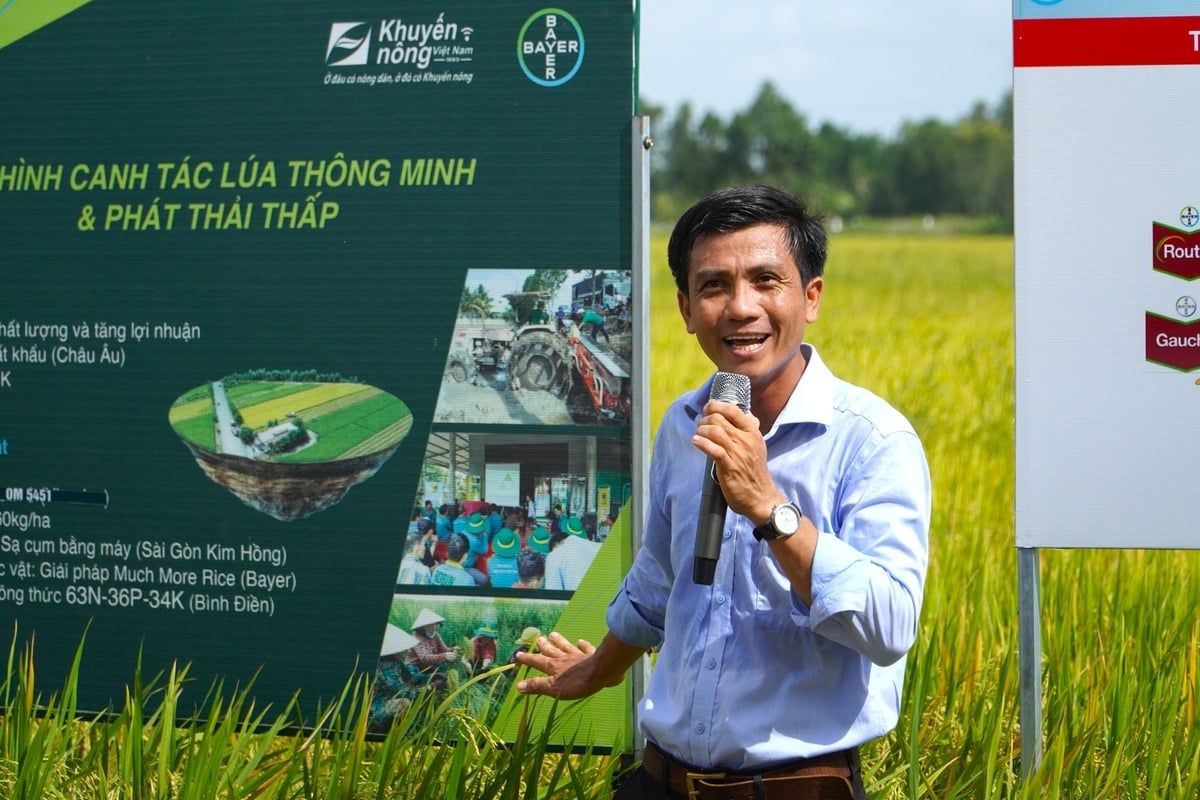
The Department of Agriculture and Environment of provinces and cities in the Mekong Delta regularly coordinates with businesses to organize demonstrations and provide guidance on high-quality rice cultivation processes and emission reduction for farmers. Photo: Kim Anh.
In accordance with the project's roadmap, he also underscored the necessity of identifying designated cultivation zones, including buffer zones, and developing and implementing concrete plans to continue expanding the area under sustainable cultivation practices.
In addition, it is imperative to prioritize the investment in the modernization of in-field irrigation systems, the promotion of water-saving and low-emission irrigation models, and the enhancement of infrastructure, storage facilities, and logistics to mitigate post-harvest losses.
"In the context of regional and inter-regional infrastructure, the Ministry of Agriculture and Environment will be the first to suggest to the Government the mobilization of the required resources. However, for infrastructure within specific production zones or scale-defined areas, localities must pay close attention and allocate local budgets and integrated funding to implement accordingly," Minister Do Duc Duy noted.
In addition, the Minister requested that the Ministry of Industry and Trade conduct a study and provide the Government with advice on the adjustment and supplementation of rice export management policies to ensure long-term effectiveness and sustainability, as well as to assist enterprises and units in market development and trade promotion.
The Minister requested that international organizations and development partners collaborate with the Ministry of Agriculture and Environment to share best practices and provide technical and financial support, particularly in the mobilization of green finance to support the implementation of low-emission rice production models.
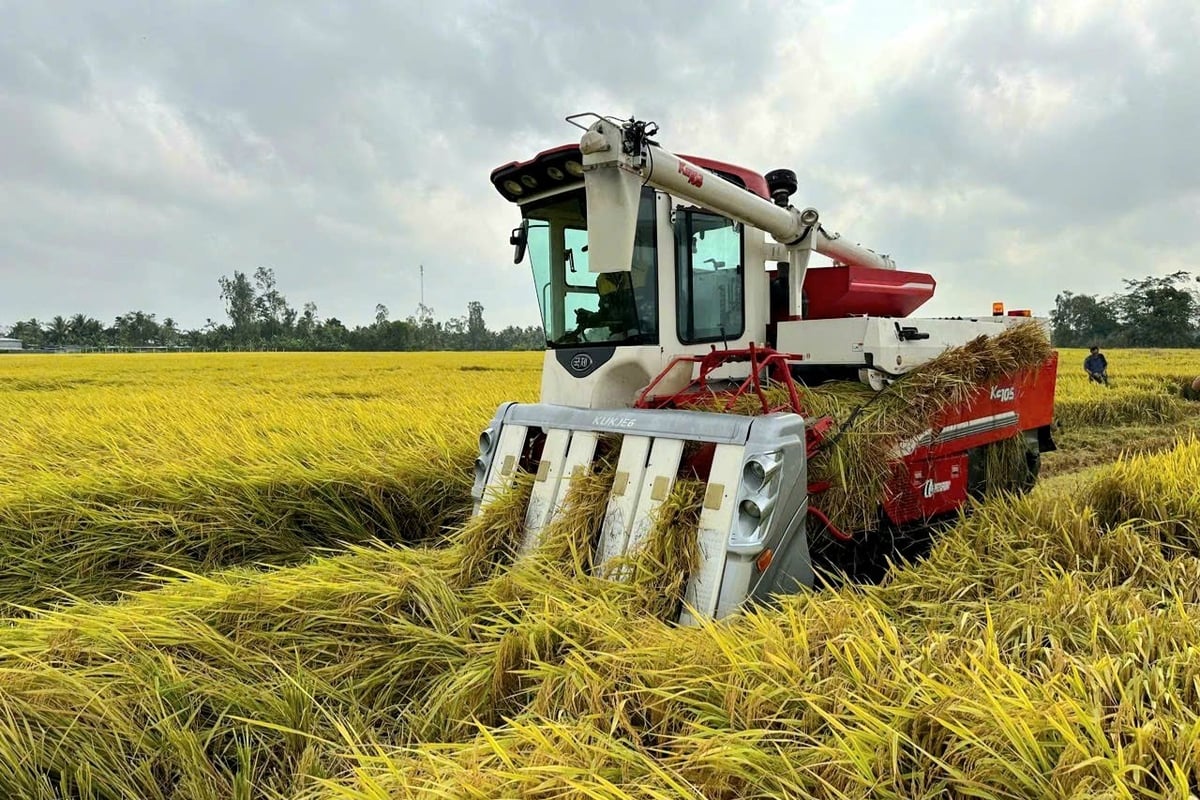
Applying mechanization is one of the solutions to promote high-quality rice production and reduce emissions. Photo: Kim Anh.
Within the project's scope, the Minister has directed the Department of Crop Production and Plant Protection to expedite the completion of the MRV (Measurement, Reporting, and Verification) procedures and the sustainable cultivation protocol. This pertains to internal agencies within the Ministry.
Department of International Cooperation was assigned the responsibility of collaborating with the Department of Climate Change to provide guidance and submit a proposal for the formation of a negotiation team for the Emission Reduction Payment Agreement (ERPA). At the same time, they were required to finalize the procedures for investment policy approval and conduct the pre-feasibility study for a World Bank loan-funded project that will facilitate infrastructure development in regions that are involved in the initiative.
Translated by Linh Linh
![Multi-channel, multi-directional Vietnamese agricultural markets: [7] Deep processing makes global reach easy](https://t.ex-cdn.com/nongnghiepmoitruong.vn/608w/files/huytd/2025/05/16/2946-che-bien-sau-chia-khoa-vang-nang-tam-nong-san-viet-tren-ban-do-the-gioi-080603_110-093858.jpg)
(VAN) The application of deep processing technology is helping Vietnamese agricultural products enhance their value, create competitive advantages, and open doors to conquer global consumers.
![Multi-channel, multi-directional Vietnamese agricultural markets: [6] Agri products go online](https://t.ex-cdn.com/nongnghiepmoitruong.vn/608w/files/content/2024/12/10/1-113313_954.jpg)
(VAN) Bringing agri products onto e-commerce platforms is an effective way to build a brand that many businesses, cooperatives, and agricultural production households are doing.

(VAN) Veterinary training should focus on quality, not just quantity. Veterinarians also need more options to pursue specialized training.

(VAN) The veterinary industry needs to be viewed objectively and further invested in to properly demonstrate its role and importance in the new context.

(VAN) The number of veterinarians graduating each year is not enough to meet actual needs, hence a difficult problem for the growing livestock industry.

(VAN) The strategic partnership between Cambodia, the Philippines, Vietnam, and CGIAR ensures that innovative solutions effectively address national priorities for food system development.

(VAN) This was affirmed by the UK Minister of State at the Department for Environment, Food and Rural Affairs during a working session with Deputy Minister Tran Thanh Nam on May 13.